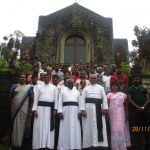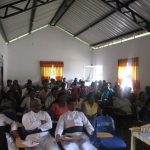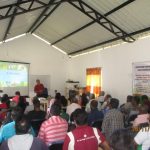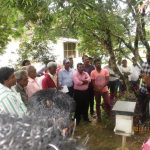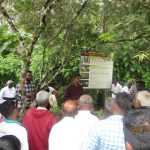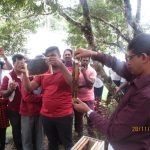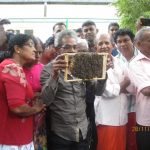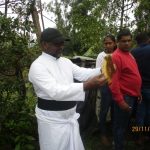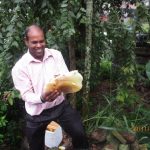Bees may be small creatures, but the role that they play in the environment is a very important one. The tiny hairs found on the bodies of these insects allow them to carry pollen from one flowering plant to another, and this process – called pollination –is how seed –bearing fruits, vegetables, grains and other crop grow.
Sri Lanka is a home to nearly 150 species of bees—and four of these species of bee produce their own honey. Apis cerana indica (or the Indian honey bee) is the honey bee mainly found in Sri Lanka. It is generally considered a robust species, quite resistant to diseases (compared to the Apis mellifera, its Western cousin).
Caritas Sri Lanka under the Program “Addressing causes for poverty and Ensuring Food Security for farming communities” conducted training on Bee keeping (or apiculture) at Bee Development Unit, Bidunuwewa, Bandarawela on 28th and 29th November 2019. 70 participants including three Diocesan Directors, Diocesan coordinators, Field officers and selected lead farmers participated from, Colombo, Chilaw, Kurunegala, Trincomalee, Batticaloa, Anuradhapura, Ratnapura, Badulla, Galle, and Food Security staff from National Centre participated in this residential training program. “Why Bee keeping is important in organic farming” was done by Mrs. Nilani Tissera, National Program Coordinator, Food Security program. Introduction to Beekeeping and maintenance of bee colonies was done by Mr. Wimukthi Gamage, Assistant Director of Agriculture, Department of Agriculture. Practical Demonstration on inspection of bee colonies was demonstrated by Mr. K. D. K. J. Kathriarachchi, Agriculture Instructor and the following subject matters were also discussed in the training;
1. Introduction to apparatus use in Bee keeping by Mr. K. D. K. J. Katthiriarachchi
2. Wax Production by Bees and Usage of wax in commercial products and Miss. A. Y. Yapa
3. Bee colony multiplication and assembling by Mr. Ruwan Kosgolla, Agriculture Instructor
4. Additional feeding of Bee colonies and favourable plants for bees by Mr. C. P. Munasinghe, Agriculture Instructor
5. Domesticated wild bee colonies by by Mr. Ruwan Kosgolla, Agriculture Instructor
6. Honey extraction by Mr. K. D. K. J. Kathriarachchi, Agriculture Instructor
A beekeeper (or apiarist) keeps bees in order to collect their honey and other products that the hive produce (including beewax, propolis, flower pollen, bee pollen, and royal jelly), to pollinate crops, or to produce bees for sale to other beekeepers.
In Sri Lanka, many cultivated crops such as vegetables and coconut need bees for the process of pollination to take place. At one time, coconut cultivators used to rear bees on the estates in order to get a better yield of coconuts.
We import about 60 to 80 metric tons of bees’ honey a year, while the annual local production is about 20 metric tons.
The Ayurveda Department has been the major consumer of the imported bees’ honey since 1986. Beauty culture industry and food industry (mainly in the production of biscuits and sweets) are the other major buyers of imported bees’ honey.
As a very general rule of thumb, in the case of a normal, balanced diet, not more than 10 teaspoons of honey (which is about 50ml) per day is recommended. This amount is formulated based on advice from some trusted honey stores, and not based on any medical point of view backed by scientific data.
Caritas Sri Lanka Food Security program is in the process of promoting beekeeping in the home gardens established.


